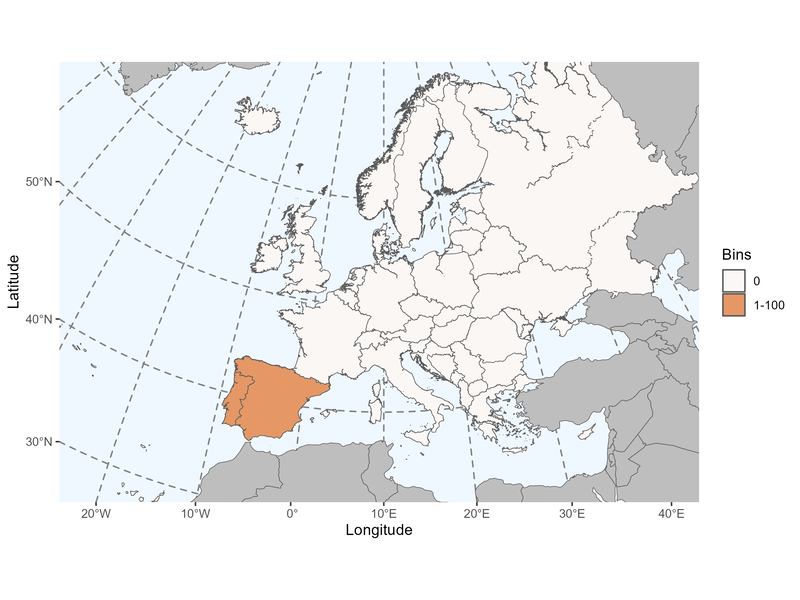Author: Warncke, 1972
|
Type species: Panurgus flavus Friese, 1897, by original designation.
|
Clade: Anthophila
Family: Andrenidae Subfamily: Panurginae Tribe: Panurgini |
|
Distinctive traits
|
Pictures of distinctive traits
|
Morphologically close genera, and how to distinguish them:
Males of Simpanurgus species have convex inner margin of the eyes, so that they are closer from one another in their middle. (Females of Simpanurgus are unknown)
Camptopoeum species have a glossa longer than the prementum.
Panurgus has a brown/black cuticle on the head and / or metasoma.
Clavipanurgus & Panurginus species have submarginal cell 2 smaller than cell 1, recurrent vein 1 almost touching cubital transverse vein 1. Females have sparse and short hairs on posterior tibia and basitarsus.
Ammobates, Biastes, Parammobatodes & Pasites have a somewhat protruding clypeus and a long-tongue morphology (segments 1 and 2 of maxillary palpi are strongly elongated).
- Flavipanurgus - Simpanurgus
Males of Simpanurgus species have convex inner margin of the eyes, so that they are closer from one another in their middle. (Females of Simpanurgus are unknown)
- Flavipanurgus - Camptopoeum
Camptopoeum species have a glossa longer than the prementum.
- Flavipanurgus - Panurgus
Panurgus has a brown/black cuticle on the head and / or metasoma.
- Flavipanurgus - Clavipanurgus & Panurginus
Clavipanurgus & Panurginus species have submarginal cell 2 smaller than cell 1, recurrent vein 1 almost touching cubital transverse vein 1. Females have sparse and short hairs on posterior tibia and basitarsus.
- Flavipanurgus - Ammobates, Biastes, Parammobatodes & Pasites
Ammobates, Biastes, Parammobatodes & Pasites have a somewhat protruding clypeus and a long-tongue morphology (segments 1 and 2 of maxillary palpi are strongly elongated).
General comments on Flavipanurgus species identification
Flavipanurgus species are distinguished among other things by the punctation of their propodeum and their anal fringe.
Flavipanurgus species are distinguished among other things by the punctation of their propodeum and their anal fringe.
Sorry, but the species identification tool is not yet available for Flavipanurgus.
Please check the reference(s) at the bottom of the page for traditional keys.
Please check the reference(s) at the bottom of the page for traditional keys.
List of the 6 Flavipanurgus species found in Europe (Ghisbain et al. 2023):
Flavipanurgus flavus (Friese, 1897)
Flavipanurgus granadensis (Warncke, 1987)
Flavipanurgus ibericus (Warncke, 1972)
Flavipanurgus kastiliensis (Warncke, 1987)
Flavipanurgus merceti (Vachal, 1910)
Flavipanurgus venustus (Erichson, 1835)
Flavipanurgus flavus (Friese, 1897)
Flavipanurgus granadensis (Warncke, 1987)
Flavipanurgus ibericus (Warncke, 1972)
Flavipanurgus kastiliensis (Warncke, 1987)
Flavipanurgus merceti (Vachal, 1910)
Flavipanurgus venustus (Erichson, 1835)
References with identification keys for some of the species:
- Osytshnjuk, A.Z. (1978). Semejstvo Andreninae – Andrenidy. In Opredelitel nasekomych evropejskoj chasti SSSR. (pp. 315-369). Leningrad: Nauka.
- Schmid-Egger C. & Scheuchl E. (1997) Illustrierte Bestimmungstabellen der Wildbienen Deutschlands und Österreichs unter Berücksichtigung der Arten der Schweiz. Band Andrenidae. Velden/Deutschland.
- Patiny, S. (1999). Description de nouvelles espèces de Camptopoeum Spinola, 1843 (Hymenoptera, Andrenidae, Panurginae). Notes fauniques de Gembloux, 37, 71-76.
- Wood, T. J., & Cross, I. (2017). Camptopoeum (Camptopoeum) baldocki spec. nov., a new panurgine bee species from Portugal and a description of the male of Flavipanurgus fuzetus Patiny (Andrenidae: Panurginae). Zootaxa, 4254(2), 285-293.
Page contributors:
You noticed a mistake? You have a suggestion to improve this page?
Don't keep it to yourself, contact us and become a contributor to IDmyBee!
References used to write this page:
- Adrien Perrard (Dec. 2019)
- Adrien Perrard (Dec. 2023)
You noticed a mistake? You have a suggestion to improve this page?
Don't keep it to yourself, contact us and become a contributor to IDmyBee!
References used to write this page:
- Ghisbain, G., Rosa, P., Bogusch, P., Flaminio, S., Le Divelec, R., Dorchin, A., Kasparek, M., Kuhlmann, M., Litman, J., Mignot, M., Müller, A., Praz, C., Radchenko, V.G., Rasmont, P., Risch, S., Roberts, S.P.M., Smit, J., Wood, T.J., Michez, D. & Reverte, S. (2023). The new annotated checklist of the wild bees of Europe (Hymenoptera: Anthophila). Zootaxa, 5327(1), 1-147.
- Michener, C.D. 2007. The Bees of the World, 2nd Edition. The John Hopkins University Press, Baltimore.
- Michez D., Rasmont P., Terzo, M., Vereecken, N. 2019. Abeilles d'Europes. Hymenoptères d'Europes, Volume 1. N.A.P. Editions.
- Nieto, A., Roberts, S. P., Kemp, J., Rasmont, P., Kuhlmann, M., García Criado, M., ... & Michez, D. 2014. European red list of bees. Luxembourg: Publication Office of the European Union, 98. (IUCN 2014)
- Rasmont, P., Devalez, Jelle, Pauly, A., Michez, D. & Radchenko, V.G. 2017. Addition to the checklist of IUCN European wild bees (Hymenoptera: Apoidea). Annales de la Société entomologique de France 53: 17-32.


